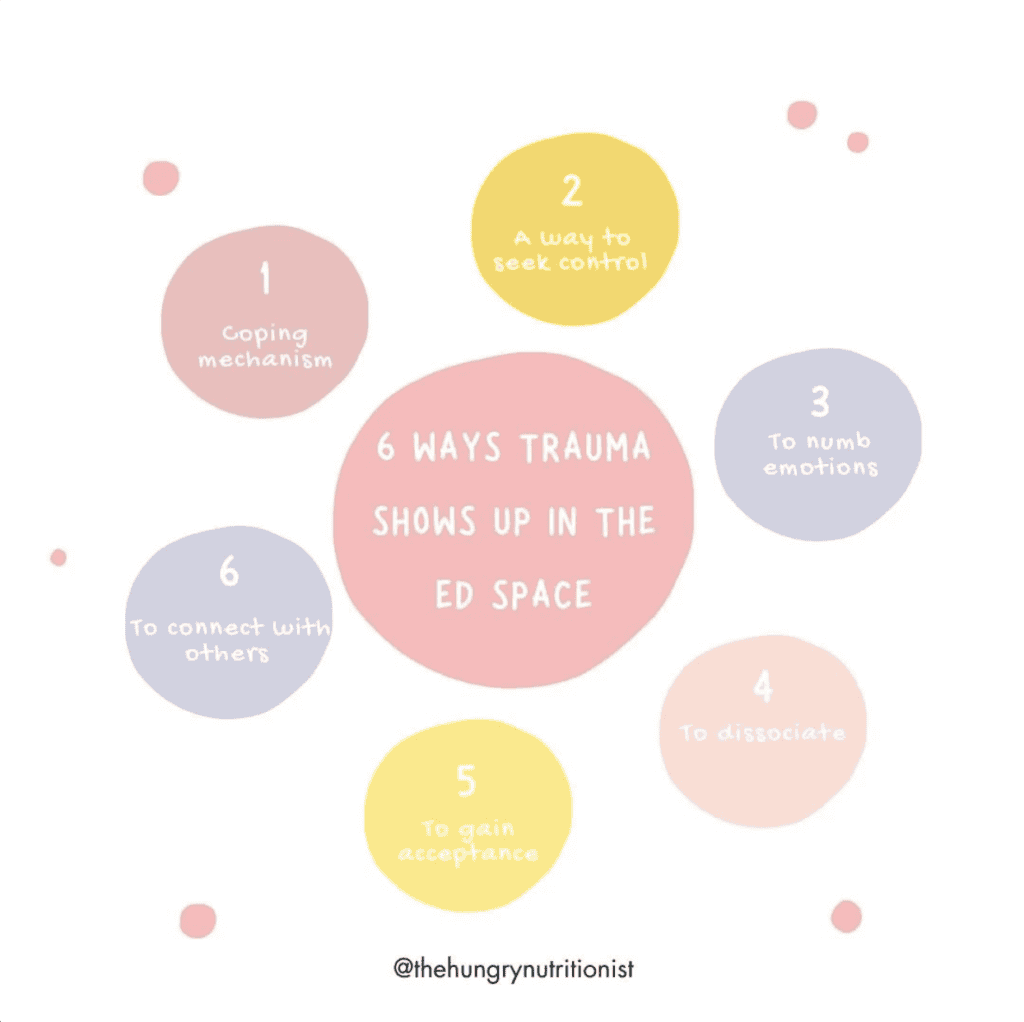Last Updated on: 8th January 2026, 07:27 am
This article was written by Associate Registered Nutritionist (ANutr) Cherie Ko, and reviewed by Registered Dietitian, Sarah Idakwo
What is trauma?
Trauma is when we experience very stressful, frightening or distressing events that are difficult to cope with or out of our control. There are many ways one can experience trauma, and while you might have a similar experience to someone else, it could affect you differently or for longer.
Traumatic experiences can disturb your nervous system function and lead to emotional irregularity. This can lead to difficulty regulating emotions as a whole, lead to mood swings, experiencing strong negative emotional states, experiencing flashbacks, and re-experiencing traumatic events (1).
What does binge eating look like?
Binge eating, often perceived simply as a lack of self-control, lack of willpower or just simply greed, can be deeply intertwined with psychological factors, notably trauma.
Binge eating can be defined as consuming a large amount of food beyond fullness within a short duration of time, accompanied by the sense of ‘losing control’ over one’s eating. The behaviour is usually secretive and associated with feelings of shame, disgust, guilt, embarrassment and low self esteem (2).
The link between trauma and binge eating

Binge eating is often driven by and used as a way to cope with strong emotions. Experiences and emotions from the aftermath of trauma could trigger binge eating episodes, and in many cases be used as an unhealthy coping mechanism as a way to deal with emotional pain and stress (3).
There has been substantial research evidence for the link between trauma and eating disorders. Research has shown that there was a strong link between PTSD and other trauma-related co-morbidities with eating disorders, including binge eating (4). In addition, one study revealed that 1 in 4 women with binge eating disorder were found to have met the criteria for PTSD (4).
Trauma, stress and binge eating
While trauma impacts everyone differently, a common response among those affected is a significant increase in stress levels. This stress response can persist long after the traumatic event has passed, a remnant of the body’s instinctive mechanism to manage danger by triggering a flight-or-fight response.
This stress can be characterised by heightened vigilance and a rush of hormones like adrenaline and cortisol. While these hormonal changes are crucial for navigating immediate threats, they can disrupt various bodily processes when these levels remain elevated over an extended period (6).
Chronic stress, often a consequence of trauma, has been shown to not only increase appetite but also intensify cravings for high-calorie, sugary, and fatty foods. This physiological change can make food seem like a reliable source of comfort (7). Thus, turning to binge eating as a way to cope with traumatic experiences might seem logical. It provides a temporary respite from emotional distress. However, this coping mechanism does not offer lasting relief and can sometimes escalate into self-destructive behaviours.

Self-Blame, Guilt, Self-Harm and bingeing
Trauma often leaves individuals grappling with intense feelings of self-blame and guilt. These emotions can arise from circumstances where individuals feel responsible for events that were, in reality, beyond their control. Unfortunately, we know that individuals who experience these emotions are more susceptible to engaging in self-destructive behaviours, including disordered eating patterns and binge eating (8)
Binge eating can sometimes be used as an outlet for self-harm. Being plagued with intense feelings of guilt, shame, and self-loathing, some individuals might turn to the restrict/binge cycle and extreme dieting as forms of self-punishment and self-harm (9). The cyclical nature of these behaviours often exacerbates the underlying trauma, creating a feedback loop that is difficult to break.
How to tackle binge eating from trauma
The first step to tackling binge eating is acknowledging that it stems from traumatic experience and working to resolve trauma.
Working out what is triggering binge eating episodes can help you understand, prepare and manage them when it does happen. Another key thing to manage binge eating is to work on healing our relationship with food, weight, and our bodies. In many cases, bingeing is brought on by attempts to diet or eat restrictively, and can weaken your ability to follow natural cues that lets us know when we are hungry, satisfied, or full. Practising intuitive eating, which is a trauma informed frame-work can be a way to get back in touch with those signals and reconnect with food.

Developing healthy coping skills and self-care is essential for healing. The first step on this path is to be gentle with yourself. Understand that binge eating has been a coping mechanism—a way of navigating the challenges that life has thrown your way. Recognise that you are doing your best and show yourself some compassion.
Engaging in hobbies that nourish the spirit such as practising deep breathing, journaling, gentle movement you enjoy if this is accessible to you, art, singing or listening to music you love can help to reduce the reliance on binge eating as a form of emotional relief.
Conclusion
Remember, this journey is about healing and reclaiming your life. It’s not about judgement or blame. Be kind to yourself, embrace self-compassion, lead with non-judgemental curiosity, and seek the support and guidance you need. You’re stronger than you think you are, and there’s a brighter future ahead.
Take the First Step Towards Recovery Today
If you are struggling with trauma and binge eating, you are not alone. Remember, recovery is possible, and taking the first step is the most important part of the journey. Reach out to our team today here to schedule your free discovery call.


